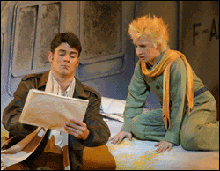Boston Lyric Opera imports The Little Prince , the BSO premieres Yehudi Wyner’s piano concerto, and Renée Fleming
By LLOYD SCHWARTZ | April 19, 2006
 I hope the estate of Leonard Bernstein is collecting royalties for The Little Prince. Rachel Portman’s unremittingly sweet and relentlessly lilting score for this children’s opera based on Antoine de Saint-Exupéry’s famous story borrows heavily from Bernstein’s Candide and West Side Story. Also from Puccini, Stephen Sondheim, John Adams, and countless other less high-profile composers. This is Portman’s first opera, though she’s written numerous film scores, winning an Oscar for the film adaptation of Jane Austen’s Emma (the Gwyneth Paltrow version). It had its world premiere at the Houston Grand Opera in 2003, and Boston Lyric Opera and the Wang Center have now brought that production to Boston’s Shubert Theatre, where it runs through Sunday.
I hope the estate of Leonard Bernstein is collecting royalties for The Little Prince. Rachel Portman’s unremittingly sweet and relentlessly lilting score for this children’s opera based on Antoine de Saint-Exupéry’s famous story borrows heavily from Bernstein’s Candide and West Side Story. Also from Puccini, Stephen Sondheim, John Adams, and countless other less high-profile composers. This is Portman’s first opera, though she’s written numerous film scores, winning an Oscar for the film adaptation of Jane Austen’s Emma (the Gwyneth Paltrow version). It had its world premiere at the Houston Grand Opera in 2003, and Boston Lyric Opera and the Wang Center have now brought that production to Boston’s Shubert Theatre, where it runs through Sunday.
The most captivating children’s operas — Ravel’s touching L’enfant et les sortileges (with a libretto by Colette that also includes encounters between a little boy and talking animals), Humperdinck’s Hänsel und Gretel, Janácek’s Cunning Little Vixen, Oliver Knussen’s setting of Maurice Sendak’s Where the Wild Things Are (all of which The Little Prince echoes) — are characterized by the individuality of their music and a complex tone that includes acknowledging life’s disharmonies. But Portman’s parallel four-bar phrases and æthereally tinkling celesta, harp, and glockenspiel sugar-coat Saint-Exupéry’s already dangerously-close-to-precious fable, with its philosophy that one sees clearly only with the heart and that the essential is invisible to the eye. The morning after, I couldn’t remember a note, because the melodies had no profile and the harmonies no bite. The musical emphasis is often on the wrong word ("I need a sheep to TAKE back home"). The closing moralizing chorus, a theatrical and operatic cliché, sends you out into the world with the most cloying music. British playwright Nicholas Wright’s rhymes are sometimes witty, sometimes just arch; his limping dramatic structure creates no suspense.
Not that The Little Prince isn’t a slick and professional piece of work. The travels of the extraterrestrial Little Prince and his meetings with stereotypes — human (a Vain Man, a pompous Businessman, a rattled Geographer with a scratchy pen, a weasly Alice-in-Wonderland King, a guilt-ridden Drunkard) and non-human (a wise fox, a sneaky snake, a newborn rose) — give Portman the opportunity to weave in various musical genres (marches, dances), though the musical language remains generic. (Another model for Portman, William Walton’s Façade, also has a catalogue of genres, but they always sound like Walton.) The skillful orchestration is at least gratifying for the players, and BLO music director Stephen Lord led a superb ensemble with grace and energy. (Oboist Laura Ahlbeck’s Sondheim-like solos stood out.)
 Topics
Topics:
Music Features
, David Kravitz, Entertainment, Maurice Sendak, More  , David Kravitz, Entertainment, Maurice Sendak, Leonard Bernstein, Renee Fleming, Wang Center, Richard Strauss, Stephen Sondheim, Audra McDonald, Robert Levin, Less
, David Kravitz, Entertainment, Maurice Sendak, Leonard Bernstein, Renee Fleming, Wang Center, Richard Strauss, Stephen Sondheim, Audra McDonald, Robert Levin, Less 